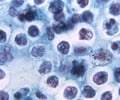The Drugs for Neglected Diseases initiative (DNDi) announced the first research and development project in its new helminth infection drug portfolio to address unmet needs

The project is supported by a grant from The Bill & Melinda Gates Foundation.
While remaining fully committed to kinetoplastid diseases (sleeping sickness, leishmaniases, and Chagas disease) DNDi is expanding its drug portfolio to include helminth infections, focusing specifically on filariasis, because in patients co-infected with filariasis and loa loa, the standard treatment of ivermectin, alone or in combination with albendazole, can result in brain dysfunction, coma, and potentially death.
The objective is to assess and reformulate flubendazole, which has proven highly active against adult filarial worms in animals and humans, into a safe, highly efficacious, and field-adapted macrofilaricidal drug candidate.
If successful, flubendazole would be highly useful for case management and in mass drug administration (MDA) programs to treat, control, and eliminate filarial infections, regardless of parasitic worm life stage. Current drugs primarily kill young worms whereas a macrofilaricide would kill adult worms.
"DNDi is focusing on developing a safe macrofilaricide – to kill the adult worms – with no severe adverse reactions," said Dr Shing Chang, Director of R&D at DNDi. "Such a drug could be used as an alternative preventive treatment with a major public health impact."
Advertisement
"The first step of this project is to assess the safety profile in pre-clinical studies to further reformulate flubendazole and develop a safe, highly efficacious, and field-adapted macrofilaricidal drug candidate," explains Dr. Charles MacKenzie of Michigan State University, who was involved in early work on flubendazole. "Flubendazole is the only macrofilaricide candidate on the horizon that has demonstrated positive in vivo results."
Advertisement
"Without new tools adapted to the needs of patients in the poorest and remote areas of the world it will be difficult, if not impossible, to eliminate some of the most common neglected tropical diseases," said Dr. Bernard Pécoul, Executive Director of DNDi. "To achieve sustainable control and potential elimination of helminth infections, we need to both improve implementation of existing tools and develop better drugs for patients in whom current treatments do not work."
The initial investigations by DNDi to assess its helminth drug portfolio were made possible with the financial support of Doctors Without Borders/Médecins Sans Frontières.
Source-Eurekalert








